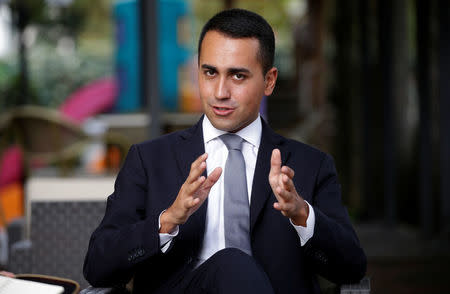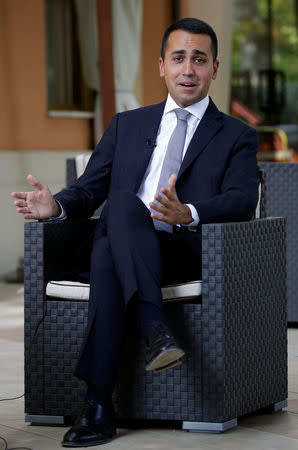I'm no populist, says new leader of Italy's 5-Star
By Gavin Jones RIMINI, Italy (Reuters) - The new leader of Italy's anti-establishment 5-Star movement says it is not a populist party and will make cutting waste and reducing debt its priority. 5-Star, which leads most opinion polls ahead of national elections due early next year, has been trying to shed its maverick, populist image and reassure foreign capitals that it can be trusted with power. Luigi Di Maio, the 31-year-old lawmaker picked on Saturday to lead the movement, told Reuters on Sunday that 5-Star stood for "post ideological" common sense, and was opposed to right-wing and left-wing extremism. "I reject populism as a label for 5-Star," he said in an interview on the sidelines of the party's annual gathering in Rimini, on the Adriatic coast. 5-Star, founded by comedian Beppe Grillo nine years ago as a protest movement, bases its appeal mainly on opposition to corruption and vested interests. Boyish-looking and usually immaculately turned out in suit and tie, Di Maio presents a more moderate image than Grillo, who is famous for raucous tirades against the ruling elite. He had been groomed for the leadership by Grillo, who is 69 and now plans to withdraw gradually from his figurehead role. Di Maio said many of the party's proposals, such as a public bank to fund investments, had been adopted with success by mainstream parties in Northern Europe which he wanted to emulate. CUTTING DEBT, BOOSTING INVESTMENT He said that, if 5-Star won next year's election, due by May, he would try to negotiate changes to European Union fiscal rules to allow Italy to invest more to boost its stagnant economy. However, he said he would also cut waste, arguing that this was the best way to bring down Italy's huge public debt, forecast to be just under 132 percent of GDP this year, the highest in the euro zone after Greece's. "We have brought down debt in every town and city where 5-Star governs. We will do that at the national level too," he said. 5-Star has rowed back from a pledge to hold a referendum on Italy's membership of the euro and now says this would only be a last resort if the EU rejects any reforms to current budget rules. Di Maio, who comes from Italy's poor south and entered parliament at 26 five years ago, after mostly doing odd jobs and internet marketing, dismissed the suggestion that he was too inexperienced to be prime minister. "I came from a part of Italy with 60 percent youth unemployment, and people who sneer at my background are sneering at thousands of young Italians who are trying to create a future for themselves," he said. The ability to build a competent team was the most important quality for a prime minister, Di Maio said, vowing to present a full cabinet line-up before the election. Asked to name three priorities that would mark his leadership of the party, Di Maio listed universal income support for the poor, cutting wasteful public spending and increasing forms of direct democracy. (editing by Silvia Aloisi and Editing by Kevin Liffey)

 Yahoo News
Yahoo News 

